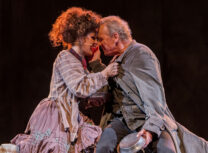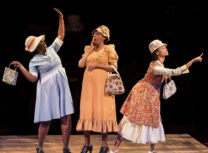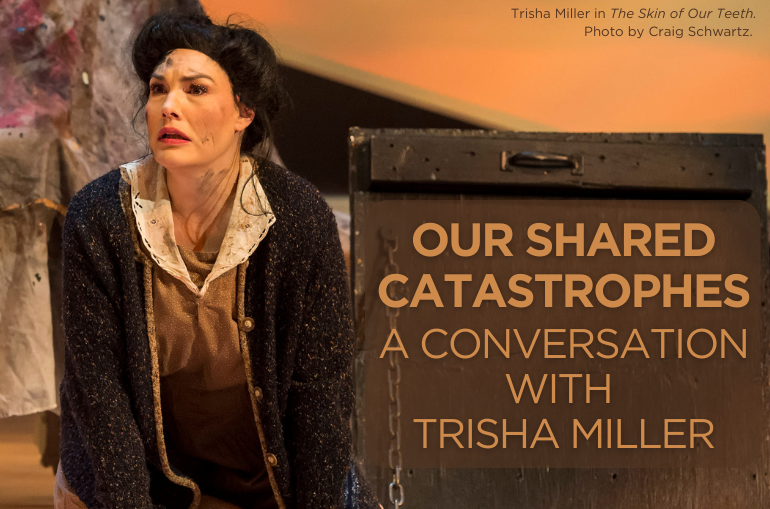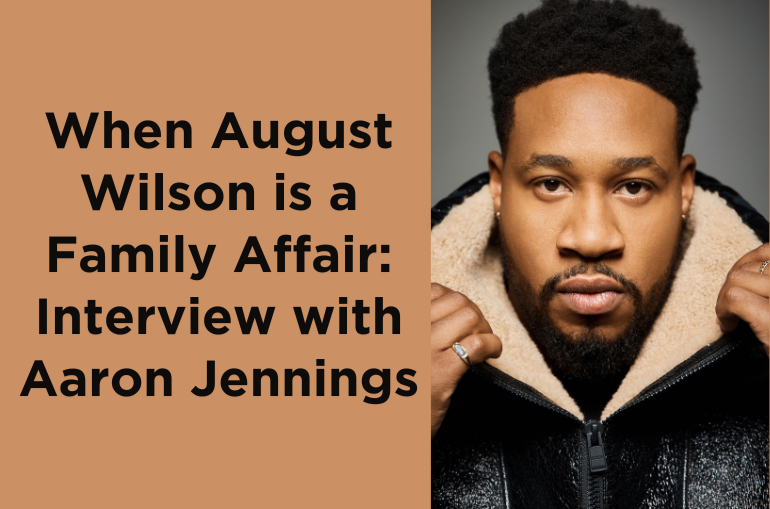You Asked, They Answered
By A Noise Within
November 17, 2015
After every performance this fall, patrons have been filling out our post-show surveys (thank you!). Here are the some answers to a few frequently asked questions.
ANTIGONE
How did the actors prepare for their roles?
Inger Tudor, Chorus: Primarily, Rob (Dean, the director) and I worked on making sure the Chorus was not like a traditional narrator and that she was a character with a point of view. We wanted the audience to never be quite sure what the Chorus might say or what disposition or attitude she might have in saying it. A lot of time was spent on delivery of the monologues: making sure the important information was emphasized and finding the right tone so it felt more like a conversation than simply storytelling. Simultaneously, I worked on figuring out who this woman was and what investment she had in the other characters.
Do the actors see a connection between their characters and contemporary people and situations?
 Eric Curtis Johnson, Creon: The answer is both “Yes, of course” and “No, not at all.” The “Yes, of course” comes because the themes of this play are so timeless and universal. In the early weeks of our run, a number of audience members brought up Kentucky County Clerk Kim Davis and her stand against issuing gay marriage licenses (which led some of our audience to empathize with Creon.) Just a few weeks later, with that controversy no longer in the headlines, I doubt anyone is making that connection. But I’m sure more post-show discussions would reveal that people see Hillary in Antigone. Or Ben Carson. Or themselves. I’ve always seen my own 19-year old self in Antigone, taking big stands against The Man over personal slights. Come to think of it, I can see that headstrong youth in Creon too, making a bad decision but sticking to it at all costs, in order to avoid being seen as weak. So, yes. There are connections to be made, and they’re quite easy to make even without referring to the outside world. I believe Robinson Crusoe could make them.
Eric Curtis Johnson, Creon: The answer is both “Yes, of course” and “No, not at all.” The “Yes, of course” comes because the themes of this play are so timeless and universal. In the early weeks of our run, a number of audience members brought up Kentucky County Clerk Kim Davis and her stand against issuing gay marriage licenses (which led some of our audience to empathize with Creon.) Just a few weeks later, with that controversy no longer in the headlines, I doubt anyone is making that connection. But I’m sure more post-show discussions would reveal that people see Hillary in Antigone. Or Ben Carson. Or themselves. I’ve always seen my own 19-year old self in Antigone, taking big stands against The Man over personal slights. Come to think of it, I can see that headstrong youth in Creon too, making a bad decision but sticking to it at all costs, in order to avoid being seen as weak. So, yes. There are connections to be made, and they’re quite easy to make even without referring to the outside world. I believe Robinson Crusoe could make them.
The “No, not at all” is more practical from an actor’s standpoint. It comes because little of that stuff is useful in the actual playing of it, at least in the spirit of our production. When I’m examining Creon’s internal life, he is just Creon. Antigone is just Antigone. I could put on an outrageous wig and a New York accent and make Creon Trump but then I’d be making the audience unnecessary. Or at least passive. If we come out on stage and play The Kim Davis Controversy, As Seen Through Antigone, then we’re just being didactic. And you didn’t come to the theater to be schooled. I hope you came to engage. So the important question is really: Does the audience see a connection to contemporary people and situations? I hope you do. And a second viewing might reveal different connections!
ALL MY SONS
How you can get to that intense emotional place night after night and what kind of psychological and physical toll does it take on you?
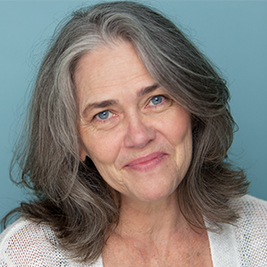 Deborah Strang, Kate Keller: The emotion is really quite exhilarating. It’s like running a marathon, and afterwards you might be tired and sore, but you feel euphoric. The emotion seems to release all the stress from my day to day life, so that I’m actually calmer after the show. Arthur Miller helps me get to that emotional place every performance. It’s such a beautiful, perfect play. Sometimes I feel like all I really have to prepare for is my first entrance–the rest is just knowing and understanding Kate’s need to keep the family together and alive–and respond accordingly to anyone who gets in the way of that.
Deborah Strang, Kate Keller: The emotion is really quite exhilarating. It’s like running a marathon, and afterwards you might be tired and sore, but you feel euphoric. The emotion seems to release all the stress from my day to day life, so that I’m actually calmer after the show. Arthur Miller helps me get to that emotional place every performance. It’s such a beautiful, perfect play. Sometimes I feel like all I really have to prepare for is my first entrance–the rest is just knowing and understanding Kate’s need to keep the family together and alive–and respond accordingly to anyone who gets in the way of that.
Aaron Blakely, George Deever:This may sound a little pretentious, but I’d like to keep most of my process to myself. That said, years of training, practicing my craft, deep preparation, being present in the moment, and allowing myself permission to fail are what allow me to act in this play or any others which demand heightened emotional states. The Arthur Miller’s play itself is so brilliant and I believe in its message so much that it’s easier to get on the rollercoaster in this one and let it take you.
What is it like doing All My Sons in rotation with a comedy like A Flea in Her Ear?
 Jeremy Rabb, Dr. Jim Bayliss (Jeremy also plays Ferraillon in A Flea in Her Ear:I love it. I’m always eager to explore a new character, so getting to alternate between two characters in one season is tremendously rewarding. On the face of it, the transition can seem tricky since the world of each is so dramatically different. But the characters in both plays are so well written and go after objectives that are so specific and clear, that once I’m in their shoes, I’m ready for their journey. What makes rotating repertory theater so wonderful is that it not only connects us to past generations when such back-and-forth was more standard, but it also enables our audiences to see familiar actors transform and interact with each other in entirely different ways. It also creates deeper bonds between actors. At ANW in particular, I have the luxury of working with company members I’ve built a chemistry and trust with over several years. That makes it easier to go from lightly joking around with Geoff in his backyard one night, to kicking and screaming at him to follow my orders the next. And what’s more fun than that?
Jeremy Rabb, Dr. Jim Bayliss (Jeremy also plays Ferraillon in A Flea in Her Ear:I love it. I’m always eager to explore a new character, so getting to alternate between two characters in one season is tremendously rewarding. On the face of it, the transition can seem tricky since the world of each is so dramatically different. But the characters in both plays are so well written and go after objectives that are so specific and clear, that once I’m in their shoes, I’m ready for their journey. What makes rotating repertory theater so wonderful is that it not only connects us to past generations when such back-and-forth was more standard, but it also enables our audiences to see familiar actors transform and interact with each other in entirely different ways. It also creates deeper bonds between actors. At ANW in particular, I have the luxury of working with company members I’ve built a chemistry and trust with over several years. That makes it easier to go from lightly joking around with Geoff in his backyard one night, to kicking and screaming at him to follow my orders the next. And what’s more fun than that?
A FLEA IN HER EAR
How did Rafael manage to maintain Camille’s accent?
Rafael Goldstein, Camille: I approached Camille the same way I approach a character with a British accent. He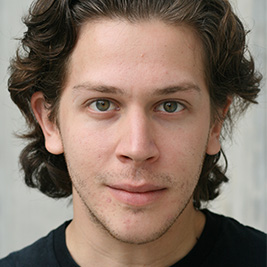 makes sounds that I don’t make, so I researched how someone with a cleft palate speaks. The truth is that, by the time someone with a cleft palate has reached my age, they will have figured out how to make most sounds necessary for comprehensible speech. On top of that, most cleft palates are bridged early in life, thanks to advances in surgery. So, I returned to the script, as an actor always must. David Ives has written out Camille’s lines as, “Ah uhoooh ooh ah oo eee i ahhooo ahhh hehoo?” I applied a little of the research I had done, honoring Ives’ intention for the character, made clear what needs to be clear, and muddled what needs to be muddled.
makes sounds that I don’t make, so I researched how someone with a cleft palate speaks. The truth is that, by the time someone with a cleft palate has reached my age, they will have figured out how to make most sounds necessary for comprehensible speech. On top of that, most cleft palates are bridged early in life, thanks to advances in surgery. So, I returned to the script, as an actor always must. David Ives has written out Camille’s lines as, “Ah uhoooh ooh ah oo eee i ahhooo ahhh hehoo?” I applied a little of the research I had done, honoring Ives’ intention for the character, made clear what needs to be clear, and muddled what needs to be muddled.
Are the two Spanish speakers really bilingual, or did they have to learn the Spanish lines?
 Jill Hill, Lucienne Homénidès de Histangua: My second language is French, I am not Spanish speaking, but my husband in the play Luis, and our Director Julia Rodriguez Elliott speak Spanish, and they helped me with the lines. I recorded Julia, and just practiced and practiced; I also wrote the meaning of the words under each line, so I could understand the sentence structure and exactly what I was saying with each line. Maria who runs the costume shop told me I spoke Spanish with a French accent, perfect for the play, since Lucienne is a French woman who married a Spaniard and moved to Spain! I love the opportunity to do accents and other languages on stage…I had to do Mandarin Chinese once!!!
Jill Hill, Lucienne Homénidès de Histangua: My second language is French, I am not Spanish speaking, but my husband in the play Luis, and our Director Julia Rodriguez Elliott speak Spanish, and they helped me with the lines. I recorded Julia, and just practiced and practiced; I also wrote the meaning of the words under each line, so I could understand the sentence structure and exactly what I was saying with each line. Maria who runs the costume shop told me I spoke Spanish with a French accent, perfect for the play, since Lucienne is a French woman who married a Spaniard and moved to Spain! I love the opportunity to do accents and other languages on stage…I had to do Mandarin Chinese once!!!
